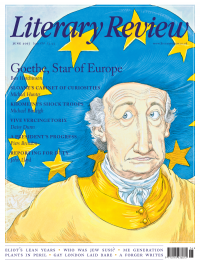Suzi Feay
Road to Perdition
A Boy in Winter
By Rachel Seiffert
Virago 240pp £14.99
The action of Rachel Seiffert’s third novel takes place over three days in a small town in Ukraine in November 1941. One set of hated invaders – the Russians – has retreated and the SS arrive, wasting no time in rounding up the Jewish population. Unusually for a writer tackling the Nazis, Seiffert refuses to fetishise uniforms, weapons, vehicles, hierarchies or psychopathy. A novel can do all that and still be a masterpiece – see Jonathan Littell’s The Kindly Ones. But Seiffert’s aim is different, and her worm’s-eye view is all the more powerful for its restraint.
The boy of the title is Yankel, flitting in and out of the narrative like a feral cat, difficult to catch or tame. ‘His books were blotted and streaked and smeary; he thought in rash and bold strokes, and only ever in short bursts’, daydreaming through prayers and the singing

Sign Up to our newsletter
Receive free articles, highlights from the archive, news, details of prizes, and much more.@Lit_Review
Follow Literary Review on Twitter
Twitter Feed
Though Jean-Michel Basquiat was a sensation in his lifetime, it was thirty years after his death that one of his pieces fetched a record price of $110.5 million.
Stephen Smith explores the artist's starry afterlife.
Stephen Smith - Paint Fast, Die Young
Stephen Smith: Paint Fast, Die Young - Jean-Michel Basquiat: The Making of an Icon by Doug Woodham
literaryreview.co.uk
15th-century news transmission was a slow business, reliant on horses and ships. As the centuries passed, though, mass newspapers and faster transport sped things up.
John Adamson examines how this evolution changed Europe.
John Adamson - Hold the Front Page
John Adamson: Hold the Front Page - The Great Exchange: Making the News in Early Modern Europe by Joad Raymond Wren
literaryreview.co.uk
"Every page of "Killing the Dead" bursts with fresh insights and deliciously gory details. And, like all the best vampires, it’ll come back to haunt you long after you think you’re done."
✍️My review of John Blair's new book for @Lit_Review
Alexander Lee - Dead Men Walking
Alexander Lee: Dead Men Walking - Killing the Dead: Vampire Epidemics from Mesopotamia to the New World by John Blair
literaryreview.co.uk